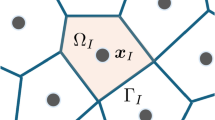Abstract
In this paper, a locally-defined stabilized adaptive explicit approach is considered to analyse generalized coupled thermo-mechanical models. In this sense, a modified central difference method is applied, which performs adapting itself along the solution process, considering the properties and results of the model, as well as the relations between the adopted temporal and spatial discretizations. The proposed technique enables stabilized decoupled analyses, allowing each “phase” of the coupled model to be handled separately, without considering stability restrictions for their time solutions, providing a very versatile and efficient methodology. In addition, the new approach is designed as a single-solve framework based on reduced systems of equations, which further greatly improves the efficiency of the technique. The new method enables adaptive algorithmic dissipation in the higher modes, and it is highly accurate, simple to implement and entirely automated, requiring no decision or expertise from the user. Numerical results are presented at the end of the manuscript, illustrating the performance and effectiveness of the new approach.










Similar content being viewed by others
References
Lord, H.W., Shulman, Y.: A generalized dynamical theory of thermoelasticty. J. Mech. Phys. Solids 15, 229–309 (1967)
Balla, M.: Analytical study of the thermal shock problem of a half-space with various thermoelastic models. Acta Mech. 89, 73–92 (1991)
Balla, M.: Formulation of coupled problems of thermoelasticity by finite elements. Period. Polytech. Mech. Eng. 33, 59–70 (1989)
Soares, D.: A locally stabilized central difference method. Finite Elem. Anal. Des. 155, 1–10 (2019)
Soares, D.: Nonlinear analysis of non-Fourier heat conduction problems by a locally stabilized explicit approach. Adv. Eng. Softw. 139, 102735 (2020)
Farhat, C., Park, K.C., Dubois-Pelerin, Y.: An unconditionally stable staggered algorithm for transient finite element analysis of coupled thermoelastic problems. Comput. Methods Appl. Mech. Eng. 85, 349–365 (1991)
Lee, T.W., Sim, W.J.: Efficient time-domain finite element analysis for dynamic coupled thermoelasticity. Comput. Struct. 45, 783–793 (1992)
Larsson, F., Hansbo, P., Runesson, K.: Space-time finite elements and an adaptive strategy for the coupled thermoelasticity problem. Int. J. Numer. Methods Eng. 56, 261–293 (2003)
Wakeni, M.F., Reddy, B.D., McBride, A.T.: An unconditionally stable algorithm for generalized thermoelasticity based on operator-splitting and time-discontinuous Galerkin finite element methods. Comput. Methods Appl. Mech. Eng. 306, 427–451 (2016)
Guo, P., Wu, W.H., Zhao, J.: Modelling of generalised thermoelastic wave propagation of multilayer material under thermal shock behaviour. Shock Vib. 2017, ID 8398673 (2017)
Soares, D., Telles, J.C.F., Carrer, J.A.M.: A boundary element formulation with equilibrium satisfaction for thermo-mechanical problems considering transient and non-linear aspects. Eng. Anal. Bound. Elem. 31, 942–948 (2007)
Sladek, J., Sladek, V., Solek, P., Tan, C.L., Zhang, C.: Two- and three-dimensional transient thermoelastic analysis by the MLPG method. Comput. Model. Eng. Sci. 47, 61–95 (2009)
Zander, N., Kollmannsberger, S., Ruess, M., Yosibash, Z., Ranka, E.: The finite cell method for linear thermoelasticity. Comput. Math. Appl. 64, 3527–3541 (2012)
Zheng, B.J., Gao, X.W., Yang, K., Zhang, C.Z.: A novel meshless local Petrov–Galerkin method for dynamic coupled thermoelasticity analysis under thermal and mechanical shock loading. Eng. Anal. Bound. Elem. 60, 154–161 (2015)
Hasanpour, K., Mirzaei, D.: A fast meshfree technique for the coupled thermoelasticity problem. Acta Mech. 229, 2657–2673 (2018)
Sator, L., Sladek, V., Sladek, J.: Coupling effects in transient analysis of FGM plates bending in non-classical thermoelasticity. Compos. B 165, 233–246 (2019)
Hughes, T.J.R.: The Finite Element Method. Dover, New York (2000)
Zienkiewicz, O.C., Taylor, R.L., Zhu, J.Z.: The Finite Element Method—Its Basis and Fundamentals, vol. 1. Butterworth Heinemann, Oxford (2000)
Hilber, H.M., Hughes, T.J.R., Taylor, R.L.: Improved numerical dissipation for time integration algorithms in structural dynamics. Earthq. Eng. Struct. Dyn. 5, 283–292 (1977)
Fried, I.: Bounds on the extremal eigenvalues of the finite element stiffness and mass matrices and their spectral condition number. J. Sound Vib. 22, 407–418 (1972)
Lambert, J.D.: Computational Methods in Ordinary Differential Equations. Wiley, New York (1973). (ISBN 978-0471511946)
Routh, E.J.: A Treatise on the Stability of a Given State of Motion: Particularly Steady Motion. Macmillan, New York (1877)
Hurwitz, A.: Über die Bedingungen unter welchen eine Gleichung nur Wurzeln mit negativen reellen Teilen besitzt. Math. Ann. 46, 273–284 (1895)
Danilovskaya, V.I.: Thermal stresses in an elastic half-space due to sudden heating of its boundary (in Russian). Prikl. Mat. Mech. 14, 316–318 (1950)
Newmark, N.M.: A method of computation for structural dynamics. J. Eng. Mech. 85, 67–94 (1959)
Ting, E.C., Chen, H.C.: A unified numerical approach for thermal stress waves. Comput. Struct. 15, 165–175 (1982)
Prevost, J.H., Tao, D.: Finite element analysis of dynamic coupled thermoelasticity problems with relaxation times. J. Appl. Mech. 50, 817–822 (1983)
Tosaka, N., Suh, I.G.: Boundary element analysis of dynamic coupled thermoelasticity problems. Comput. Mech. 8, 331–342 (1991)
Chen, J., Dargush, G.F.: BEM for dynamic poroelastic and thermoelastic analysis. Int. J. Solids Struct. 32, 2257–2278 (1995)
Hosseini-Tehrani, P., Eslami, M.R.: BEM analysis of thermal and mechanical shock in a two-dimensional finite domain considering coupled thermoelasticity. Eng. Anal. Bound. Elem. 24, 249–257 (2000)
Acknowledgements
The financial support from CNPq (Conselho Nacional de Desenvolvimento Científico e Tecnológico) is gratefully acknowledged.
Author information
Authors and Affiliations
Corresponding author
Additional information
Publisher's Note
Springer Nature remains neutral with regard to jurisdictional claims in published maps and institutional affiliations.
Rights and permissions
About this article
Cite this article
Soares, D. An efficient adaptive time-marching formulation for decoupled analysis of generalized thermo-mechanical models. Acta Mech 231, 4479–4495 (2020). https://doi.org/10.1007/s00707-020-02761-0
Received:
Published:
Issue Date:
DOI: https://doi.org/10.1007/s00707-020-02761-0




